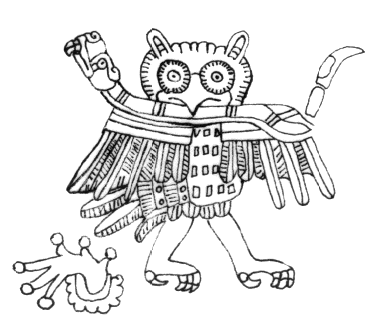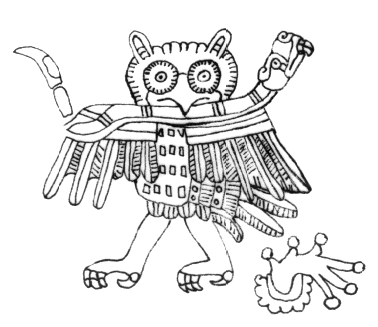演出された本物性
Staged Authenticity
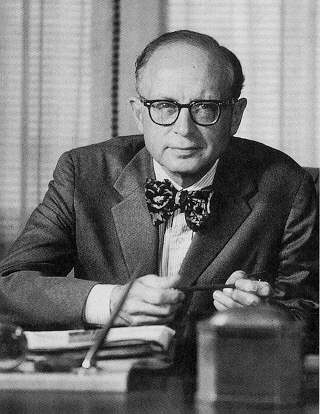
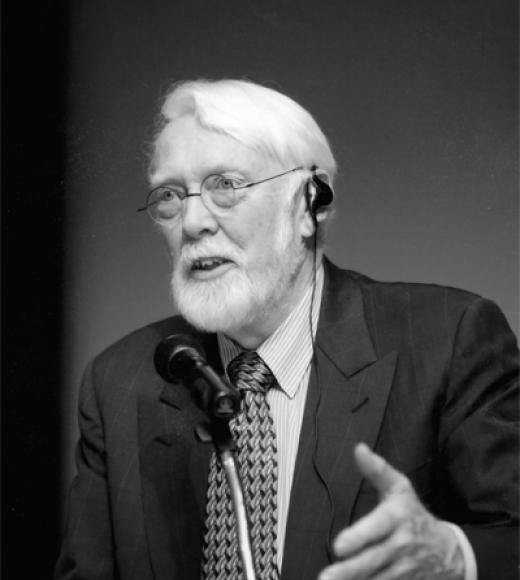
Daniel Joseph Boorstin, 1914-2004
演出された本物性
Staged Authenticity


Daniel Joseph Boorstin, 1914-2004
ダニエル・ブーアスティン[Daniel Joseph Boorstin](1964)は、現代の観光は「疑似 イベント」になってしまったと批判した。その箇所のタイトル「旅行者から観光客へ」が示すように、ブーアスティンは偽の体験をさせられている観光客の主体 性の喪失を嘆く。
この見解を批判したのはディーン・マッカネル(Dean MacCannell, 1940- )であ る。彼は、疑似イベントは観光の社会関係が生んだものであり、むしろ観光客自身はオーセンティシティ(authenticity)つまり真正でリアルな 「本物」を求めているのだと主張する(MacCannell 1976:103-4)。マッカネルの本物に関する議論は、社会学者ゴフマンの役割理論における<おもて>と<うら>という2つの領域の区分を導入する。 日常生活を演劇論的な観点から分析するなかでアーヴィング・ゴフマンは言う。演技者は、舞 台の<おもて>と舞台の<うら>の両方を行き来できるが、観客が見聞きできるの は<おもて>の部分だけである。<うら>の領域は隠されているが観客はそれを覗きたがるものである。なぜなら<うら>には本物があると思われているから だ。社会的リアリティを確固とするためには、ある種の神秘化が必要なのだ、とマッカネルは言う(MacCannell 1976:93)。だからマッカネルの関心は観光客の本物の探究のプロセスにあるのではなく、近代社会において本物が隠される神秘化とその暴露の弁証法的 プロセスにある。
さて観光客は、舞台裏のリアルな世界(=本物)を目 的地において覗こうとする。
しかし、<うら>を見せることは普段の生活の中では 許されず、観光地の人びともそれを拒否する。そのために観光業者たちは観光客に舞台裏を見せる操作つまり演出をおこなう。このような加工によって観光客に 提示されるのがマッカネルの言う「演出された本物」(staged authenticity)である。彼は、人びとに対して「演出された本物」が提示される例として、消防署や工場や銀行などへの児童向けの社会見学や、ふ だん訪れることのできないケープ・ケネディ宇宙センターへの観光などをあげている。立入禁止の領域に入ることを、そのような社会見学や観光は可能にする。 だが児童や観光客が入っているのは実際の業務がおこなわれる空間ではあるが、その空間でおこなわれる現実の業務そのものは含まれていなかったり、制限され たものになっている。つまり観光客に見せられるものは、ゴフマンの言うところの<うら>の舞台ではなく「演出された」<うら>の領域だというわけだ。マッ カネルによればこの「演出された」<うら>の領域は、いまだ分析用語が与えられていない、言わば「生きた博物館の類のもの」であるという (MacCannell 1976:98-99)。
例えばエコ・ツアー(エコロジカル・ツーリズム、生 態観光)での自然はすべてが本物であり「演出された本物」などはないと言えるだろうか。対象となっている「自然」の本物性について考えよう。自然保護区の 物理的および認識論的な空間区分について注意すれば明白なように、「自然」は不均質な空間である。自然公園の多くは、観光客に公開している部分と非公開の 区域があり、観光客は許可された部分しか歩くことはできない。エコ・ツーリストに開放されている空間とは、管理者や科学者だけが歩ける空間(=本物)とは 区分されている。
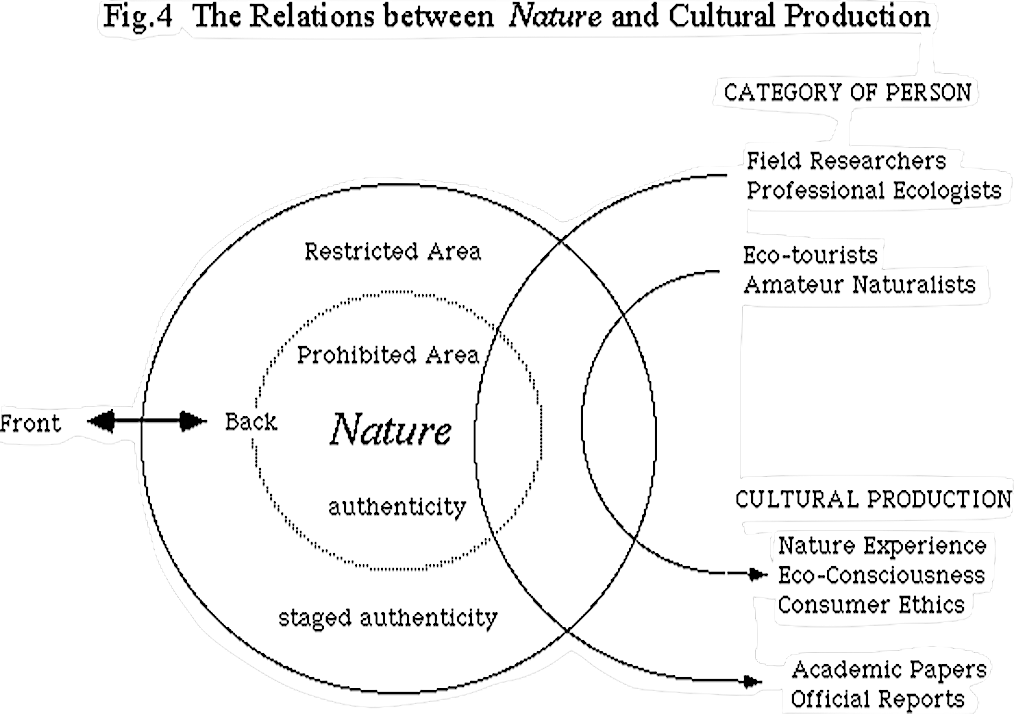
Source: Eco-Tourism, Exploitation and the Cultural Production of the Natural Environment in Costa Rica
観光に開放されているのは「演出された本物」の空間 である(図の左の同心円部分)。エコ・ツーリストたちはこのことを全く知らないわけではない。彼らは禁止区域があることを知っている。ガイドや管理者は、 禁断の地域を科学研究のために保存されている大切な場所であると説明する。エコ・ツーリストたちはそのサンクション(規約や規約の価値)を守ることが正し い振る舞いであることを学ぶ。本物の神秘化と「演出された本物」を通して<自然>という空間が秩序づけられている。
次にツアーそのものの本物性について考えよう。エ コ・ツーリストにとっての本物はもっと身近なものである。それは「自然」にとけ込んだ人工物の姿だ。コスタリカ中部の熱帯雲霧林の中にある高級エコ・ツ アーの「電気のない五つ星のホテル」と称されたロッジはジャングルの中の「自然」にとけ込むように設計されている。お湯のシャワーはソーラーシステムで暖 められる。「全てのエコツーリズムがここにある」と紹介する観光客向けの新聞記事は、エコ・ツアーに憧れる観光客に対して本物のエコ・ツアーが何であるか を、そこから排除されるものを通して表現する。「時に勘違いしたゲストがテニスラケットとドライヤーを持ち、カラーテレビとルームサービスを求めてやって 来るが、ここはリゾートではありません」(Costa Rica Today、一九九四年一月一三日付)。
観光客に提供される「演出された本物」と本物の倒錯 した例をエクアドルのエコ・ツアーにみることができる(Colvin 1994)。エクアドルのアマゾン上流の先住民チキュアのコミュニティには、彼ら自身が運営するエコ・ツアーがある。このツアーは先住民のガイドとともに 熱帯雨林の中で、現地の民芸品製作を観察し、神聖な儀礼に参加することを売りものにしている。これらの一連の儀礼は観光用に開催されるものであるから「演 出された」性格を有する——専門のシャーマンがおこなうのでもちろん虚構ではない。より興味深いのはエコ・ツーリストたちの取り扱い方にある。ゲストに熱 帯雨林の「本物」の生活を体験してもらうために、住民たちは観光客たちを伝統的な竹造りで茅葺きのロッジに泊まらせ、夜には蝋燭で明かりをとるようにさせ る。しかし当の先住民はブロック造りでトタン葺きの住宅に自家発電で電灯を引いて生活しているのだ。ここで、エコ・ツーリストの要求に応えて造り上げられ た「演出された本物」をイパーリアルな複製つまり「シュミラークル」(ボードリヤール、一九八四)とみなし、この現象全体を消費社会が行き着く反ユートピ アとして見ることは妥当ではない。私は「演出された本物」の制作を先住民の生存のための生産行為として見る可能性を提示したい。その根拠は「演出された本 物」が、現実でも虚構でもないあり得るべき「本質」を表象するものとして、先住民にも観光客にも受け入れられているからである。ここでは「演出された本 物」は両者の間での合意を意味する。
● Dean MacCannell, 1940-
Dean MacCannell is Professor and Chair of Landscape Architecture at the University of California, Davis, and the author of Empty Meeting Grounds (1992) and The Time of the Sign (1982).
"Sus escritos tratan
sobre los aspectos sociales y culturales del turismo, el arte, la
arquitectura, el diseño y el urbanismo. Es autor de numerosas obras y
artículos de investigación. Hasta la fecha, en castellano se han
publicado El turista (Melusina, 2003), en la que se halla la génesis de
la sociología del turismo, y Lugares de encuentro vacíos (Melusina,
2007), una importante contribución a la literatura del paisaje, la
comunidad y la cultura." - Dean MacCannell.
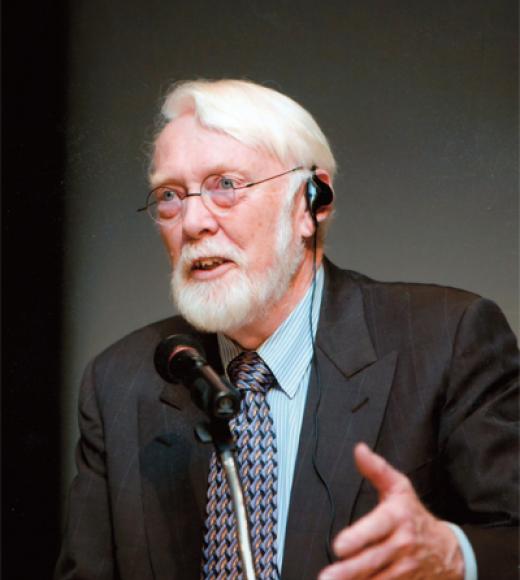
● Daniel J. Boorstin (1914-2004), and The Image: A Guide to Pseudo-events in America, published in 1962.
Who is Daniel ? "Daniel Joseph Boorstin (October 1, 1914 – February 28, 2004) was an American historian at the University of Chicago who wrote on many topics in American and world history. He was appointed the twelfth Librarian of the United States Congress in 1975 and served until 1987. He was instrumental in the creation of the Center for the Book at the Library of Congress. Repudiating his youthful membership in the Communist Party while a Harvard undergraduate (1938–39), Boorstin became a political conservative and a prominent exponent of consensus history. He argued in The Genius of American Politics (1953) that ideology, propaganda, and political theory are foreign to America. His writings were often linked with such historians as Richard Hofstadter, Louis Hartz and Clinton Rossiter as a proponent of the "consensus school", which emphasized the unity of the American people and downplayed class and social conflict. Boorstin especially praised inventors and entrepreneurs as central to the American success story.[1][2]"- Daniel Joseph Boorstin.
What is The Image: A Guide to Pseudo-events in America, "is a 1962 book by the political historian Daniel J. Boorstin.[1] In his book, Boorstin argues that Americans have a false "image" of what "news" actually is. He argues that Americans mistake certain "pseudo-events" for real news, when in fact they are the contrivances of politicians and news corporations.[2] The Image begins by noting that Americans have "extravagant expectations" when it comes to their news consumption. To a degree, they demand to be entertained. Truly important, naturally occurring news stories, however, do not occur regularly or predictably -- there may be droughts of newsworthy stories. In order to "fill the gap," news corporations report what Boorstin calls "pseudo-events." Pseudo-events are political spectacles (usually) organized by politicians to tell a certain narrative. For example, a mayor may "cut the ribbon" at the grand re-opening of a historic hotel; the President may "pardon a turkey"; or, most commonly, a politician might organize a press release. These pseudo-events, however, are often mistaken for real news. And, more importantly, the media consumers seeing these pseudo-events often mistakenly believe these politicians are engaging "in politics." The Image is also well-known for defining a celebrity as "a person who is known for his well-knownness." Boorstin argued that in the 1960s leaders were beginning to resemble "media stars," rather than politicians. Boorstin further warned that if the voting public continued to be inundated with pseudo-events and un-nuanced media coverage, these media stars would soon dominate the political landscape. Of important note, this book was written in the years following the 1960 Presidential Election, where many commentators have noted that Kennedy's appearance and demeanor on the first televised presidential debate may have swung the election.[3]" - The Image: A Guide to Pseudo-events in America.
| ブーアスティンの擬似イベント(pseudo-event)論
(Boorstin 1962:39-40) |
|
| (1) Pseudo-events are more
dramatic. A television debate
between candidates can be planned to be more
suspenseful (for example, by reserving questions
which are then popped suddenly) than a casual
encounter or consecutive formal speeches planned
by each separately. |
|
| (2) Pseudo-events, being planned
for dissemination, are
easier to disseminate and to make vivid. Participants
are selected for their newsworthy and dramatic
interest. |
|
| (3) Pseudo-events can be
repeated at will, and thus their
impression can be re-enforced. |
|
| (4) Pseudo-events cost money to
create; hence somebody
has an interest in disseminating, magnifying, advertising,
and extolling them as events worth watching or
worth believing. They are therefore advertised in advance,
and rerun in order to get money's worth. |
|
| (5) Pseudo-events, being planned
for intelligibility, are
more intelligible and hence more reassuring. Even if
we cannot discuss intelligently the qualifications of
the candidates or the complicated issues, we can at least judge the
effectiveness of a television performance.
How comforting to have some political
matter we can grasp! |
|
| (6) Pseudo-events are more
sociable, more conversable,
and more convenient to witness. Their occurrence is
planned for our convenience. The Sunday newspaper
appears when we have a lazy morning for it.
Television programs appear when we are ready with
our glass of beer. In the office the next morning,
Jack Paar's ( or any other star performer's) regular
late-night show at the usual hour will overshadow
in conversation a casual event that suddenly came
up and had to find its way into the news. |
|
| 7) Knowledge of
pseudo-events--of what has been reported,
or what has been staged, and how-becomes
the test of being "informed." News magazines provide
us regularly with quiz questions concerning not
what has happened but concerning "names in the
news"-what has been reported in the news magazines.
Pseudo-events begin to provide that "common
discourse" which some of my old-fashioned friends
have hoped to find in the Great Books. |
|
| (8) Finally, pseudo-events spawn
other pseudo-events
in geometric progression. They dominate our consciousness
simply because there are more of them,
and ever more. |
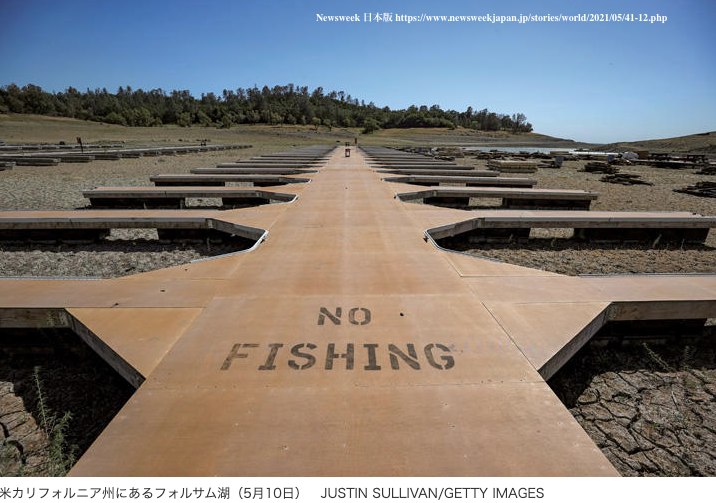
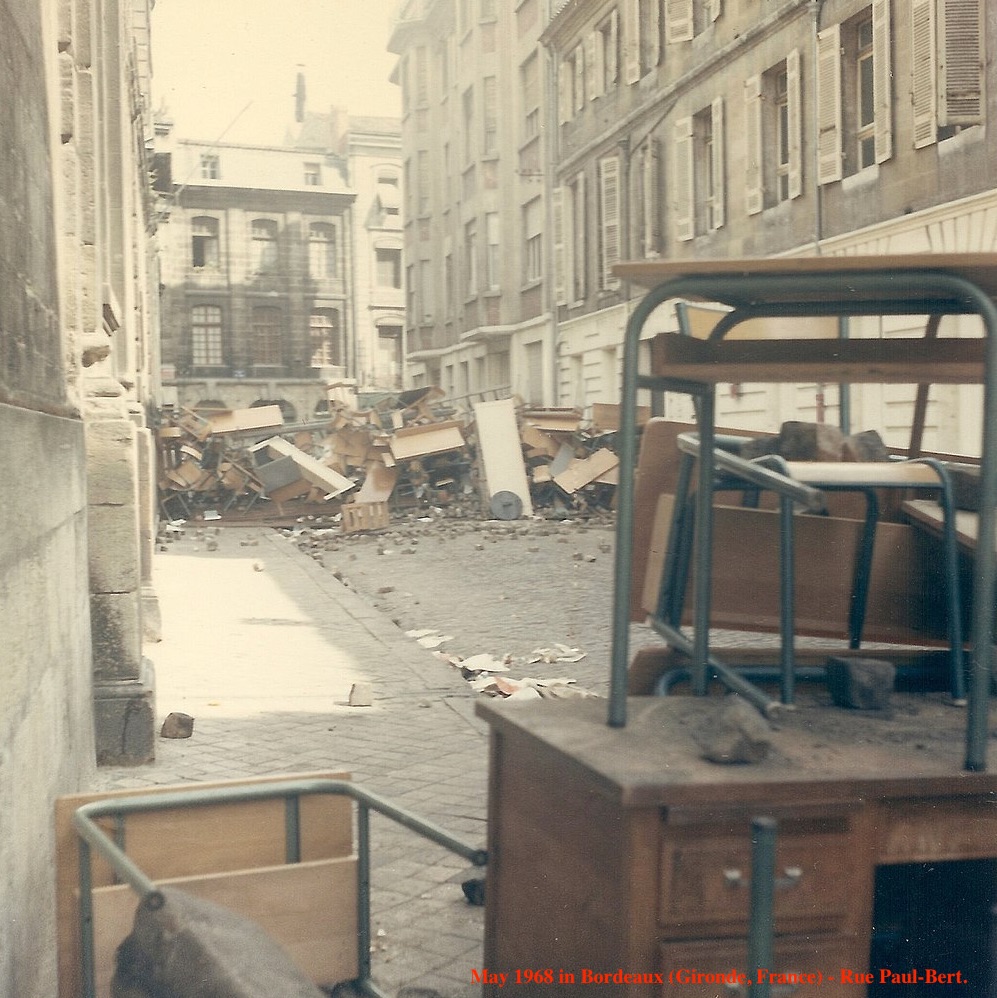
リンク
文献
その他の情報
Do not copy and paste, but you might [re]think this message for all undergraduate students!!!
